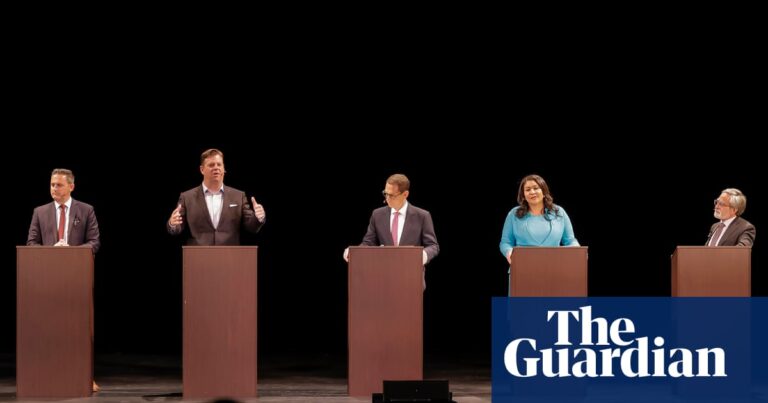San Francisco’s Evolving Political Landscape Amid Homelessness Crisis
Supreme Court Ruling and Mayor’s Response
In a recent ruling, the conservative majority of the Supreme Court determined that cities have the authority to fine and imprison unhoused individuals for sleeping in public spaces. Mayor London Breed of San Francisco, a city known for its progressive stance, welcomed this decision as a significant step in managing the city’s public spaces more effectively.
With over 8,000 unhoused individuals in San Francisco, Breed has increasingly adopted law-and-order policies. She argued that the ruling would aid cities, including San Francisco, in their efforts to tackle homelessness, which remains a persistent and pressing challenge in the city.
Mayoral Race Heating Up
The issue of homelessness is at the forefront of San Francisco’s upcoming mayoral elections, with Breed facing multiple Democratic challengers. Notable among them are Mark Farrell, a former interim mayor, and Daniel Lurie, who is backed by significant financial resources. Farrell has proposed deploying armed National Guard troops to combat the city’s fentanyl crisis, while Lurie has suggested using technology such as ankle monitors to prevent drug dealers from returning to specific neighborhoods.
Political Landscape and Voter Sentiment
Despite its liberal reputation, San Francisco’s political climate has historically tilted toward centrist policies, particularly regarding homelessness. Observers note a tension among residents and business owners, who wish to address the visible humanitarian crisis while maintaining the city’s appeal for tourism.
“People in San Francisco don’t like to see poverty. They can be very liberal at a distance,” remarked Tony Sparks, an urban policy expert. The city’s economy fluctuates, leaving many residents disinclined to confront the realities of its homeless population.
The Impact of Tech Investors on Local Politics
A surge in political engagement from tech executives and investors marks a new phase in San Francisco’s electoral dynamics. Many of these individuals argue that progressive policies, especially those implemented during the pandemic and following the George Floyd protests, have led the city astray.
Pooling their financial resources, these tech leaders have significantly influenced local elections, including the successful recall of former District Attorney Chesa Boudin and various school board members. Their collective financial input has made the upcoming mayoral race potentially the most expensive in San Francisco’s history.
Challenges Faced by the Current Mayor
London Breed, the city’s first Black female mayor, was elected in 2018 and has a personal connection to many of San Francisco’s challenges, having grown up in public housing. While her administration has pursued a range of measures to tackle homelessness and addiction, the pandemic has exacerbated these issues, particularly with the transitioning to remote work, which has further diminished the vibrancy of the downtown area.
Even as measures to clear tents and encampments have been implemented, the number of unhoused individuals has seen a 7% increase according to a federal count, suggesting that surface-level solutions may not effectively address the underlying crisis.
The Political Context of Crime and Homelessness
The narrative surrounding crime and homelessness has gained traction, leading some political candidates to pledge aggressive tactics to manage these challenges. Many observers believe that the current focus of local leaders is not genuinely on resolving homelessness but rather on obscuring it from public view.
Critics assert that this reflects a broader reluctance among voters to engage with complex social issues, often blaming bureaucracy and inefficiencies in local governance while pushing for immediate, visible results.
Financial Support and Campaign Allegations
As the mayoral campaign progresses, financial support remains a pivotal factor. Mayor Breed’s campaign has been bolstered by well-known tech figures, while Farrell and Lurie also draw substantial backing from affluent donors. Currently, allegations of financial impropriety surround both Breed and Farrell, threatening to overshadow their campaigns. Questions of ethics are being raised concerning various initiatives and management practices.
While the San Francisco Chronicle endorsed Lurie, acknowledging his potential for change, they emphasized concerns about his inexperience and ambitious promises regarding homelessness. He has adopted an outsider approach, leveraging his family wealth for campaign financing while facing skepticism about his expertise in city governance.
Conclusion: A Complicated Future Ahead
As San Francisco prepares for the upcoming election, the landscape is a complex interplay of progressive ideals, centrist realities, and the pressing need for effective governance. With ranked-choice voting in place, the dynamics of support for various candidates will be crucial in determining the future direction of the city. Local voters are caught between the desire for compassionate solutions to homelessness and a clear demand for visible order and safety.



